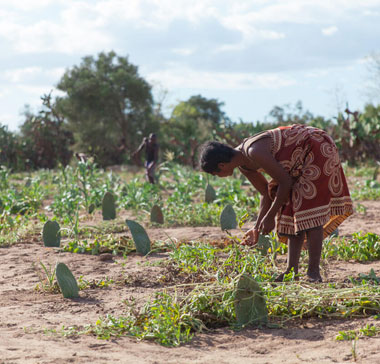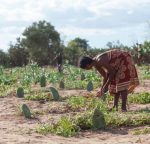The challenges undermining global food security call for a complex approach embracing investment, policy reforms and better use of resources, Qu Dongyu, Director-General of the Food and Agriculture Organization of the United Nations (FAO) told a key meeting of the G20 on July 10.
“Recent global events, from the COVID-19 pandemic to the climate crisis, multiple conflicts around the world and the war in Ukraine, have all heavily affected agrifood systems in multiple ways,” Qu told the G20 Sherpa meeting of senior government representatives.
Qu cited the recently launched 2022 edition of the State of Food Security and Nutrition in the World (SOFI) Report, which confirms that world hunger increased again in 2021, reflecting growing inequalities across and within countries. It says 828 million people suffered from hunger in 2021, an increase of 46 million from 2020 and 150 million from 2019 before the pandemic.
The war in Ukraine has added to an already challenging situation and could lead to an increase of 13 million more chronically undernourished people this year, and 17 million more in 2023, according to FAO estimates.
Another global challenge is rising inflation, with world food prices increasing since mid-2020 due to many factors. FAO calculates that the increase in the food import bill for the 62 most vulnerable countries amounts to $24.6 billion in 2022, and it affects 1.79 billion people.
In response to this growing challenge, FAO has developed a proposal for a global Food Import Financing Facility, which aims to assist countries in financing their food purchases to minimize any risk of social unrest. “This proposal should be implemented by the IMF (International Monetary Fund) under their balance of payments financial mechanism,” the FAO Director-General urged.
Among the other challenges, average fertilizer prices have increased significantly, almost tripling since mid-2021, together with rising energy prices. Changes in trade routes and current constraints will further increase the global fertilizer price. If countries producing major food staples, such as rice, are not able to get enough fertilizers in the upcoming planting season, this could affect the global supply of food, said Qu.
Trade reduction and interruption of the supply chain are of major concern, the Director-General added. At the end of May, 22 countries had implemented export restrictions through 39 measures ranging from bans to export taxes affecting almost 16% of agricultural exports, on a kilocalorie basis.
Package of Measures Needed
To address these challenges, Qu said the international community needs to implement a package of measures that include:
- Invest in countries most in need that are most affected by the increase in food prices. In addition to providing timely food aid, focus on boosting productivity by paying more attention to producing nutritious food locally. Currently only 8% of all food security funding in emergencies goes to assist agricultural production. Investing in agriculture and rural livelihoods is strategic, and 7 to 10 times more cost-effective than traditional assistance.
- Put policies in place that both increase productivity and protect natural resources, and that are specific to regional needs. Transforming agrifood systems to deliver healthy, nutritious diets, and with more equitable outcomes, will require significant financial investment, estimated at 8% of the size of the agrifood market. Accelerate the African Continental Free Trade Area by speeding up the normative work on food safety standards, and by reducing tariffs and non-tariff barriers. Intraregional trade as well as investment should be accelerated in all regions of the world.
- Ensure better and more efficient use of available outputs and inputs to produce more with less. This must include water, as water stress remains a priority, with 1 billion hectares of agricultural land facing severe water constraints; 800 million hectares of rainfed cropland and pastureland severely affected by recurring drought. Use the best available technologies and regulations for efficient gains in the way we use water in agriculture. Reducing food loss and waste is key, as the current high amounts of loss and waste could feed around 1.26 billion people per year. Fertilizers also need to be used more efficiently, with the aid of technology and science based re-distribution of applications across the production process, supported by fast implementation of detailed soil maps to assist the most vulnerable countries to use their fertilizers efficiently.
“It is critical to facilitate the smooth functioning of global food markets and to secure food supply for all,” Qu said.





















